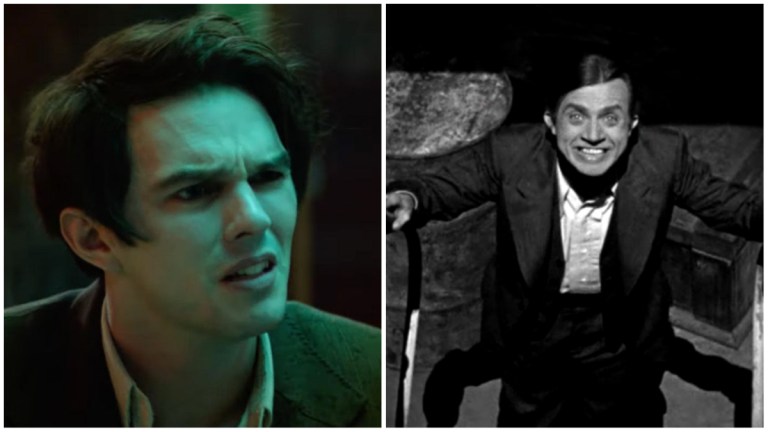Renfield: Nicholas Hoult Channels the Classic Universal Version of Dracula Sidekick
Nicholas Hoult’s comedy reimagining of Dracula homages the best Renfield we’ve ever had onscreen.

It is difficult to imagine audiences ever found Dwight Frye scary in 1931, but they apparently did. With his high-strung voice and bug-eyed stare—all suggesting the countenance of someone who hasn’t slept in weeks yet feasts on coffee by the hour—Frye is unforgettable as R.M. Renfield, the doomed solicitor who foolishly traveled to Castle Dracula alone in the 1931 film version of Dracula. But scary? He was more a figure of tragedy… or from the right point of view, farce.
It would seem Nicholas Hoult, Nicolas Cage, and the entire team making this spring’s peculiar comedy-horror hybrid, Renfield, would agree. For the first time in cinematic history, the old fly-eater who was originally invented as a tragic, macabre side character in Bram Stoker’s 1897 novel is the hero of his own story. It only took 126 years! Ahead of release, the film is receiving a lot of attention and anticipation for how Cage, the Master of the BIG PERFORMANCE, will interpret Dracula. But based on the first teaser for the new movie, which you can view below, we were immediately taken with how much of Frye’s 1931 interpretation of Renfield has gone into Hoult’s recreation of the title character.
Yes, there is the naturally more youthful appearance that Hoult was almost certain bring to the part—and that’s a step apart from the last memorable Renfield, a middle-aged and demented Tom Waits in Bram Stoker’s Dracula (1992, and in a movie directed by Cage’s uncle!). However, there is more than a hint of Frye, or at least Frye-inspired performances, in Hoult’s mannerism and appearance, from his disheveled brown suit to his haphazard hair. Right down to an extravagantly posh English accent, which Frye famously attempted in Dracula’s early scenes before the clerk’s transformation, Hoult seems to be homaging the most iconic screen interpretation of the character…. or at the very least how Peter MacNicol also channeled it as the best running joke in Mel Brooks’ Dracula: Dead and Loving It! (1995).
Frye was perhaps one of the most underrated character actors on the Universal Pictures lot in his day. Originally a pianist who transitioned to acting on the stage during the 1920s, Frye was best known for his comedic turns in live performance before traveling to Hollywood in time for the transition to sound. After appearing as the neurotic and pitiable Renfield in Tod Browning’s 1931 adaptation of Dracula, which made a movie star of Bela Lugosi, Frye found himself similarly typecast in supporting roles as neurotic murderers and madmen. It was a development he and director James Whale appeared to have much fun with. Frye played multiple characters in Frankenstein (1931) and Bride of Frankenstein (1935), which helped create the nefarious hunchback lab assistant archetype.
Still, Frye remains best known to this day for playing R.M. Renfield. Unlike the novel, which tracks the heroic Jonathan Harker’s journey to Transylvania, the ’31 movie begins with Renfield. He’s our ostensible point-of-view character into the weird web that Dracula weaves. And his complete submission, and utter destruction, before that power is what first signaled to audiences how dominant and freaky Dracula’s presence could be.
For the rest of that movie, Frye’s Renfield has a much more prominent role than the literary Stoker creation, but he remains just as pathetic and doomed, unable to resist Dracula’s thrall even as he weeps for the women the vampire consumes—as well as for the soul Renfield already knows he has lost. MacNicol later proved it can be a funny part… but is it a heroic one?
That is something we haven’t seen before, and the new trailer for Renfield seems to tease the possibility as it focuses on Hoult’s version of the character going to a group self-help session and begging for assistance in breaking from his “toxic relationship.” That’s putting it mildly. This Renfield’s determination for self-betterment intentionally echoes the zombie who dreams of romance in Warm Bodies (2013), while his cadence recalls the boyish to fault interpretation of bratty Tzar Peter on Hulu’s The Great.
Will Hoult’s Renfield be the first to save himself from the Count, and will audiences be able to buy him as the hero of his own story? We’ll find out when Renfield opens April 14.
